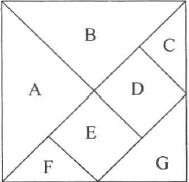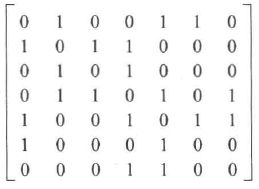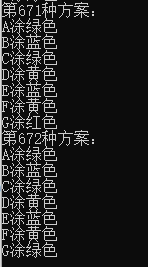- YOLO目标检测模型优化技术全景解析
YOLO目标检测模型优化技术全景解析作为实时目标检测领域的标杆算法,YOLO系列模型通过持续的技术革新不断提升性能边界。本文将从模型架构设计、数据优化、注意力机制融合、后处理策略及训练方法等维度,系统剖析YOLO优化领域的关键技术与最新进展。一、模型架构优化:突破性能瓶颈的核心路径多尺度检测层增强针对小目标检测难题,主流方案通过增加浅层检测通道优化特征提取。例如在YOLOv5中引入160×160特
- 【加解密与C】Rot系列(四)Rot8000
阿捏利
加解密与Cc语言Rot8000
Rot8000简介Rot8000是一种基于Unicode字符集的旋转加密算法,类似于经典的Rot13,但扩展到了更大的字符范围(通常是Unicode的基本多语言平面,即U+0000到U+FFFF)。Rot13仅适用于26个拉丁字母,而Rot8000通过覆盖更多字符(如中文、符号等),增强了加密的灵活性和趣味性。Rot8000加密原理Rot8000的核心思想是将每个Unicode字符的码点值加上0x
- python排序算法之基数排序
华强笔记
python数据结构和算法python算法
#代码如下:'''基数排序:1.把数据分为10个桶,以为数字有0-9这10个2.依次把数据的个位,十位,百位等等各个位数的数据进行分桶排序,放在这10个桶中3.最大的数有k位,则循环k次4.时间复杂度O(kn),空间复杂度O(k+n),其中k=log10(n)+1'''defradixs_sort(li):max_num=max(li)it=0while10**it<=max_num:bucket
- python折半查找算法_python二分查找代码 试用递归法编写python程序实现折半查找算法...
python二分查找算法函数bi_search(),该函数实现检回忆,很美却很伤;回忆只是回不到过去的记忆。输入格式:第一行为正整数n接下来若干行为待查找的数字,每行输入一个总是女人为了天长地久而烦恼,男人却可以洒脱地出乎意料。defprime(n):ifnend:return-1mid=(start+end)//2ifprimelist[mid]==prime:returnmidelifprim
- 机器学习之——认识机器学习
-睡到自然醒~
golang重构开发语言
首先,什么是机器学习?参照百度百科的讲解,“机器学习是一门多领域交叉学科,设计概率论、统计学、逼近论、凸分析、算法复杂度理论等多门学科。专门研究计算机怎样模拟或实现人类的学习能力,以获取新的知识或技能,重新组织已有的知识结构使之不断改善自身的性能。”什么意思呢?也就是说,机器学习是一门跨领域的学科,是一种能够让机器模仿人类学习能力的一种学科。在Andrew的课程中,提到了几个机器学习的定义:1,A
- Python --- day 10 Opencv模块的使用
AnAn__kang
pythonopencv开发语言
系列文章目录前言今天博主带大家进入Opencv的学习,这是一个专门针对处理图像和视频的一个模块,大家以理解为主,增强自己的编程思维,再后续我们训练模型时会大批量的处理图片时会经常用到这个模块。1OpenCV介绍OpenCV(开放源代码计算机视觉库)是一个开源的计算机视觉和机器学习软件库。由一系列C++类和函数构成,用于图像处理、计算机视觉领域的算法实现。1.1OpenCV优势**开源免费:**完全
- 时序数据库在数据库领域的行业应用
数据库管理艺术
数据库时序数据库ai
时序数据库在数据库领域的行业应用关键词:时序数据库、数据库领域、行业应用、时间序列数据、实时分析摘要:本文深入探讨了时序数据库在数据库领域的行业应用。首先介绍了时序数据库的背景知识,包括其目的、适用读者、文档结构和相关术语。接着阐述了时序数据库的核心概念、架构和工作原理,通过Python代码详细讲解了核心算法。还介绍了相关的数学模型和公式,并举例说明。在项目实战部分,给出了开发环境搭建、源代码实现
- Python --- Day3 推导式及 常见语句和内置函数的学习!!!
系列文章目录前言相信各位伙伴们在前俩次的文章和Python的基础学习中大有收获,这次我们将进入推导式,常见语句和内置函数的学习!跟着博主一起成为一名Ai的算法工程师!一、推导式用更简洁的方式创建列表、字典和集合。是Python特有的一种表达式形式。1.1列表推导式a=[1,2,3,4]result=[x*2forxina]#创建一个新列表,元素是原列表每个元素的两倍1.2字典推导式a=['a','
- 深度学习图像分类数据集—百种病虫害分类
AI街潜水的八角
深度学习图像数据集深度学习分类人工智能
该数据集为图像分类数据集,适用于ResNet、VGG等卷积神经网络,SENet、CBAM等注意力机制相关算法,VisionTransformer等Transformer相关算法。数据集信息介绍:百种病虫害识别分类,训练集45095张,验证集7508张,测试集22619张具体类别为以下:insect_classes=["rice_leaf_roller","rice_leaf_caterpillar
- 机器学习数据预处理阶段为什么需要——归一化处理
参考:https://www.cnblogs.com/bjwu/p/8977141.html通常,在DataScience中,预处理数据有一个很关键的步骤就是数据的标准化。这里主要引用sklearn文档中的一些东西来说明,主要把各个标准化方法的应用场景以及优缺点总结概括,以来充当笔记。提升模型精度在机器学习算法的目标函数(例如SVM的RBF内核或线性模型的l1和l2正则化),许多学习算法中目标函数
- 48Days-Day03 | 删除公共字符,两个链表的第一个公共结点,mari和shiny
TinaAmber
笔试训练48Days链表java算法
删除公共字符删除公共字符_牛客题霸_牛客网算法思路直接哈希,把第二个字符塞集合里面,遍历第一个,只要在集合里面有的就跳过代码importjava.util.HashSet;importjava.util.Scanner;publicclassMain{publicstaticvoidmain(String[]args){Scannerscan=newScanner(System.in);Strin
- 李航老师-统计学习
小三爷_df1b
三个准则1.作为入门选手,不要每章都看2.不要从零造轮子去实现算法,太浪费时间3.必须能手推公式章节目录##统计学习概论-统计学习的目的是对数据进行==预测与分析==-统计学习的前提是同类数据具有一定的统计规律性-统计学习的方法-监督学习(supervisedlearning)-非监督学习(unsupervisedlearning)-半监督学习(semi-supervisedlearning)-强
- 过拟合、欠拟合及其解决方案;梯度消失、梯度爆炸;循环神经网络进阶
Ryan_sz1
1、过拟合、欠拟合及其解决方案过拟合、欠拟合机器学习或者训练深度神经网络的时候经常会出现欠拟合和过拟合这两个问题,但是,一开始我们的模型往往是欠拟合的,也正是因为如此才有了优化的空间,我们需要不断的调整算法来使得模型的表达能拿更强。但是优化到了一定程度就需要解决过拟合的问题了。也就是说欠拟合是模型表达能力不够,达不到很好的表达效果。而过拟合是在训练集的范围内表达能力过强,导致完全拟合了训练集。解决
- InPixio Photo Maximizer(图片无损放大软件) v5.3.8625 便携版
InPixioPhotoMaximizer是一款用于放大和增强照片的软件。它提供了一系列功能和特点,使用户能够通过增大分辨率和细节来改善照片的质量和清晰度。软件功能图像放大:通过使用高级算法,可以将照片放大到原始分辨率的4倍,而保持良好的清晰度和细节。细节增强:通过增加图像的细节和锐度,可以改善照片的质量,并使图像更加清晰和逼真。手动调整:用户可以使用软件的手动调整工具,根据自己的需求进行尺寸和细
- “专属私有云”或“行业公有云(逻辑隔离的公共云专区)”两种主流部署模式到底有什么区别?政务云不就应该是专属的私有云么?政务云是不是不能混用?
一、安全合规性要求分层,驱动部署模式分化核心敏感系统需物理隔离(专属私有云)涉及公民隐私、国家安全(如公安、财政、医保核心数据库)的系统,必须通过物理隔离的专属私有云保障绝对控制权。例如:浦东新区公安局的涉密数据采用自建私有云,确保数据完全自主管控3。某省地市政务云要求核心业务部署在信创私有云,满足等保三级和国密算法评估要求5。非敏感公共服务适用逻辑隔离(行业公有云)面向公众的服务(如社保查询、线
- AES加密算法简要介绍
° 安如少年初如梦662
Java学习记录后端前端
前言项目中需要在接口中添加加密,简单了解关于AES的有关知识,低质低创见谅。什么是AESAES(AdvancedEncryptionStandard,高级加密标准)是一种对称加密算法,被广泛应用于数据加密领域。它是由美国国家标准与技术研究院(NIST)于2001年发布,作为一种公开标准,用于保护电子数据的安全。值得一提的是微信小程序的加密传输就是用这个加密算法基本原理和加解密过程由于站内有很详细,
- 格灵深瞳视觉算法面试30问全景精解
机 _ 长
算法面试职场和发展
格灵深瞳视觉算法面试30问全景精解——AI感知×智能安防×场景创新:格灵深瞳视觉算法面试核心考点全览前言格灵深瞳(GREATVISION)作为国内领先的人工智能与计算机视觉企业,专注于智慧安防、智能交通、智慧零售等领域,推动视觉算法在大规模城市级场景的落地。格灵深瞳视觉算法岗位面试不仅考察候选人对视觉基础理论的扎实掌握,更关注其在复杂场景下的创新能力与工程实践。本文精选30个高质量面试问题,涵盖基
- 商汤科技视觉算法面试30问全景精解
商汤科技视觉算法面试30问全景精解——AI赋能×智能视觉×产业创新:商汤科技视觉算法面试核心考点全览前言商汤科技(SenseTime)作为全球领先的人工智能平台公司,专注于计算机视觉、深度学习和智慧城市、智能汽车、智能医疗等领域,推动人脸识别、目标检测、视频分析、自动驾驶等前沿技术的产业化落地。商汤视觉算法岗位面试不仅考察候选人对视觉基础理论的扎实掌握,更关注其在大规模安防、自动驾驶、智慧医疗等复
- 旷视科技视觉算法面试30问全景精解
机 _ 长
科技算法面试深度学习YOLO
旷视科技视觉算法面试30问全景精解——AI赋能×智能安防×视觉创新:旷视科技视觉算法面试核心考点全览前言旷视科技(Megvii)作为全球领先的人工智能公司,专注于计算机视觉、深度学习和智能安防等领域,推动人脸识别、目标检测、视频分析、工业视觉等前沿技术的产业化落地。旷视视觉算法岗位面试不仅考察候选人对视觉基础理论的扎实掌握,更关注其在大规模安防、工业检测、智慧城市等复杂场景下的创新与工程能力。本文
- 蔚来汽车视觉算法面试30问全景精解
蔚来汽车视觉算法面试30问全景精解——智能电动×高阶辅助驾驶×视觉创新:蔚来汽车视觉算法面试核心考点全览前言蔚来汽车作为全球领先的智能电动汽车品牌,致力于通过AI与高阶辅助驾驶技术推动智能出行的未来。蔚来视觉算法团队专注于自动驾驶感知、智能座舱、车路协同、3D重建等领域,强调算法的工程落地、系统安全与创新突破。蔚来视觉算法岗位面试不仅考察候选人对视觉基础理论的扎实掌握,更关注其在自动驾驶、智能感知
- 深入解析Hadoop中的推测执行:原理、算法与策略
码字的字节
hadoop布道师hadoop算法推测执行
Hadoop推测执行概述在分布式计算环境中,任务执行速度的不均衡是一个普遍存在的挑战。Hadoop作为主流的大数据处理框架,通过引入推测执行(SpeculativeExecution)机制有效缓解了这一问题。该技术本质上是一种乐观的容错策略,当系统检测到某些任务执行明显落后于预期进度时,会自动在其它计算节点上启动相同任务的冗余副本,最终选择最先完成的任务结果作为输出。核心设计动机推测执行的诞生源于
- 第六届研究所圆梦反击战分仓方案老姜(姜新宁)算力3.0虚假投资真实惨痛经历为大家揭开
法律咨询维权
诈骗团伙成员根据“剧情需要”,扮演不同角色与股民聊天,“讲师”进行“炒股授课”,“水军”号假扮新手股民、资深股民在群内互动吹捧“老师”,诱导被害人在虚假平台投资。慈善投票网站买数字的等等都是骗局,广大市民对此要提高警惕,遇到此类情况一概不要相信。(注明:该文章出现名字为网上冒充行骗,跟当事人无关,如果涉及侵权,可以联系作者及时删除)Workplus六年级班云算力,云计算老姜,姜新宁云端算法骗局揭晓
- 深度强化学习 | 图文详细推导深度确定性策略梯度DDPG算法
Mr.Winter`
机器人人工智能数据挖掘深度学习神经网络强化学习具身智能
目录0专栏介绍1演员-评论家架构1.1Critic网络优化1.2Actor网络优化2深度确定性策略梯度算法0专栏介绍本专栏以贝尔曼最优方程等数学原理为根基,结合PyTorch框架逐层拆解DRL的核心算法(如DQN、PPO、SAC)逻辑。针对机器人运动规划场景,深入探讨如何将DRL与路径规划、动态避障等任务结合,包含仿真环境搭建、状态空间设计、奖励函数工程化调优等技术细节,旨在帮助读者掌握深度强化学
- 大模型软件的多租户架构设计
AI天才研究院
AI人工智能与大数据ChatGPTjavapythonjavascriptkotlingolang架构人工智能大厂程序员硅基计算碳基计算认知计算生物计算深度学习神经网络大数据AIGCAGILLM系统架构设计软件哲学Agent程序员实现财富自由
大模型软件的多租户架构设计关键词:大模型软件、多租户架构、设计、性能优化、安全性摘要:随着大数据和人工智能技术的迅猛发展,大模型软件在各个领域得到了广泛应用。然而,如何在大模型软件中实现高效的多租户架构设计,成为当前技术领域的一个关键挑战。本文将深入探讨大模型软件的多租户架构设计,包括其背景、核心概念、算法原理、系统架构、项目实战以及最佳实践等,旨在为开发者提供一套系统化、全面化的设计指南。设计过
- 鸿蒙应用App Linking优化:深度链接性能
操作系统内核探秘
操作系统内核揭秘harmonyos华为ai
鸿蒙应用AppLinking优化:深度链接性能关键词:鸿蒙系统、AppLinking、深度链接、性能优化、路由匹配、参数解析、冷启动优化摘要:本文深入探讨鸿蒙系统下AppLinking深度链接的性能优化策略。从核心概念解析出发,详细阐述深度链接在鸿蒙架构中的实现原理,包括Ability路由机制、链接解析算法和参数传递模型。通过数学模型分析路由匹配复杂度,结合Python算法示例演示链接解析过程。基
- Eureka 为大数据领域服务治理带来的新思路
大数据洞察
大数据AI应用大数据与AI人工智能eureka大数据云原生ai
Eureka为大数据领域服务治理带来的新思路关键词:Eureka,大数据,服务治理,分布式系统,微服务摘要:本文深入探讨了Eureka为大数据领域服务治理带来的新思路。首先介绍了大数据领域服务治理的背景和现状,阐述了Eureka的核心概念与工作原理。接着详细分析了Eureka核心算法原理,结合Python代码进行说明,并给出相关数学模型和公式。通过项目实战案例,展示了Eureka在大数据服务治理中
- Flink在物联网实时大数据处理中的最佳实践
大数据洞察
大数据AI应用大数据与AI人工智能flink物联网strutsai
Flink在物联网实时大数据处理中的最佳实践关键词:Flink、物联网、实时大数据处理、最佳实践、数据流摘要:本文围绕Flink在物联网实时大数据处理中的最佳实践展开。首先介绍了相关背景知识,接着深入浅出地解释了Flink、物联网和实时大数据处理的核心概念以及它们之间的关系。然后详细阐述了Flink处理物联网数据的核心算法原理、数学模型和公式。通过实际项目案例,展示了开发环境搭建、代码实现和解读。
- 边缘计算与量子模型优化驱动医疗诊断新突破
内容概要在医疗人工智能领域,边缘计算与量子模型优化的协同演进正重构诊断系统的技术范式。通过将计算节点前置至医疗设备端,边缘架构有效解决了传统云端模型面临的实时性瓶颈,配合量子优化算法对复杂特征空间的快速寻优能力,使得CT、MRI等高维影像数据的解析效率提升显著。值得关注的是,框架选型直接影响着模型部署的可行性——TensorFlow在移动端推理优化方面的工具链完备性,与PyTorch动态图机制对迭
- 经典与量子结合:微算法科技(MLGO)混合经典量子算法优化多查询问题
MicroTech2025
科技量子计算
在当今快速发展的技术领域,量子计算被视为解决复杂问题的下一个前沿。尽管量子计算机的潜力巨大,但它们在实际应用中仍面临诸多挑战,尤其是在错误率和量子比特数量方面。为了克服这些限制,微算法科技(NASDAQ:MLGO)开发了一种创新的混合算法,结合了经典计算和量子计算的优势,以优化多查询问题(MQO)。量子计算是一种利用量子力学原理进行信息处理的技术。与传统的经典计算机相比,量子计算机在处理某些特定类
- 微算法科技(MLGO)基于 Grover 的量子算法在图形游戏中寻找纯纳什均衡的创新突破
MicroTech2025
科技量子计算
随着量子计算的迅猛发展,各行各业正积极探索其潜力,特别是在博弈论领域。在博弈论中,纳什均衡是描述多个参与者在游戏中选择策略时相互影响的一种状态。在很多情况下,找到纯纳什均衡并不容易,尤其是在复杂的图形游戏中。传统算法的计算复杂性常常导致求解时间过长,因此引入量子算法有助于提高效率。Grover搜索算法是一种有效的量子搜索算法,能够在未标记的数据库中以平方根的时间复杂度找到目标元素。它通过振幅放大技
- 如何用ruby来写hadoop的mapreduce并生成jar包
wudixiaotie
mapreduce
ruby来写hadoop的mapreduce,我用的方法是rubydoop。怎么配置环境呢:
1.安装rvm:
不说了 网上有
2.安装ruby:
由于我以前是做ruby的,所以习惯性的先安装了ruby,起码调试起来比jruby快多了。
3.安装jruby:
rvm install jruby然后等待安
- java编程思想 -- 访问控制权限
百合不是茶
java访问控制权限单例模式
访问权限是java中一个比较中要的知识点,它规定者什么方法可以访问,什么不可以访问
一:包访问权限;
自定义包:
package com.wj.control;
//包
public class Demo {
//定义一个无参的方法
public void DemoPackage(){
System.out.println("调用
- [生物与医学]请审慎食用小龙虾
comsci
生物
现在的餐馆里面出售的小龙虾,有一些是在野外捕捉的,这些小龙虾身体里面可能带有某些病毒和细菌,人食用以后可能会导致一些疾病,严重的甚至会死亡.....
所以,参加聚餐的时候,最好不要点小龙虾...就吃养殖的猪肉,牛肉,羊肉和鱼,等动物蛋白质
- org.apache.jasper.JasperException: Unable to compile class for JSP:
商人shang
maven2.2jdk1.8
环境: jdk1.8 maven tomcat7-maven-plugin 2.0
原因: tomcat7-maven-plugin 2.0 不知吃 jdk 1.8,换成 tomcat7-maven-plugin 2.2就行,即
<plugin>
- 你的垃圾你处理掉了吗?GC
oloz
GC
前序:本人菜鸟,此文研究学习来自网络,各位牛牛多指教
1.垃圾收集算法的核心思想
Java语言建立了垃圾收集机制,用以跟踪正在使用的对象和发现并回收不再使用(引用)的对象。该机制可以有效防范动态内存分配中可能发生的两个危险:因内存垃圾过多而引发的内存耗尽,以及不恰当的内存释放所造成的内存非法引用。
垃圾收集算法的核心思想是:对虚拟机可用内存空间,即堆空间中的对象进行识别
- shiro 和 SESSSION
杨白白
shiro
shiro 在web项目里默认使用的是web容器提供的session,也就是说shiro使用的session是web容器产生的,并不是自己产生的,在用于非web环境时可用其他来源代替。在web工程启动的时候它就和容器绑定在了一起,这是通过web.xml里面的shiroFilter实现的。通过session.getSession()方法会在浏览器cokkice产生JESSIONID,当关闭浏览器,此
- 移动互联网终端 淘宝客如何实现盈利
小桔子
移動客戶端淘客淘寶App
2012年淘宝联盟平台为站长和淘宝客带来的分成收入突破30亿元,同比增长100%。而来自移动端的分成达1亿元,其中美丽说、蘑菇街、果库、口袋购物等App运营商分成近5000万元。 可以看出,虽然目前阶段PC端对于淘客而言仍旧是盈利的大头,但移动端已经呈现出爆发之势。而且这个势头将随着智能终端(手机,平板)的加速普及而更加迅猛
- wordpress小工具制作
aichenglong
wordpress小工具
wordpress 使用侧边栏的小工具,很方便调整页面结构
小工具的制作过程
1 在自己的主题文件中新建一个文件夹(如widget),在文件夹中创建一个php(AWP_posts-category.php)
小工具是一个类,想侧边栏一样,还得使用代码注册,他才可以再后台使用,基本的代码一层不变
<?php
class AWP_Post_Category extends WP_Wi
- JS微信分享
AILIKES
js
// 所有功能必须包含在 WeixinApi.ready 中进行
WeixinApi.ready(function(Api) {
// 微信分享的数据
var wxData = {
&nb
- 封装探讨
百合不是茶
JAVA面向对象 封装
//封装 属性 方法 将某些东西包装在一起,通过创建对象或使用静态的方法来调用,称为封装;封装其实就是有选择性地公开或隐藏某些信息,它解决了数据的安全性问题,增加代码的可读性和可维护性
在 Aname类中申明三个属性,将其封装在一个类中:通过对象来调用
例如 1:
//属性 将其设为私有
姓名 name 可以公开
- jquery radio/checkbox change事件不能触发的问题
bijian1013
JavaScriptjquery
我想让radio来控制当前我选择的是机动车还是特种车,如下所示:
<html>
<head>
<script src="http://ajax.googleapis.com/ajax/libs/jquery/1.7.1/jquery.min.js" type="text/javascript"><
- AngularJS中安全性措施
bijian1013
JavaScriptAngularJS安全性XSRFJSON漏洞
在使用web应用中,安全性是应该首要考虑的一个问题。AngularJS提供了一些辅助机制,用来防护来自两个常见攻击方向的网络攻击。
一.JSON漏洞
当使用一个GET请求获取JSON数组信息的时候(尤其是当这一信息非常敏感,
- [Maven学习笔记九]Maven发布web项目
bit1129
maven
基于Maven的web项目的标准项目结构
user-project
user-core
user-service
user-web
src
- 【Hive七】Hive用户自定义聚合函数(UDAF)
bit1129
hive
用户自定义聚合函数,用户提供的多个入参通过聚合计算(求和、求最大值、求最小值)得到一个聚合计算结果的函数。
问题:UDF也可以提供输入多个参数然后输出一个结果的运算,比如加法运算add(3,5),add这个UDF需要实现UDF的evaluate方法,那么UDF和UDAF的实质分别究竟是什么?
Double evaluate(Double a, Double b)
- 通过 nginx-lua 给 Nginx 增加 OAuth 支持
ronin47
前言:我们使用Nginx的Lua中间件建立了OAuth2认证和授权层。如果你也有此打算,阅读下面的文档,实现自动化并获得收益。SeatGeek 在过去几年中取得了发展,我们已经积累了不少针对各种任务的不同管理接口。我们通常为新的展示需求创建新模块,比如我们自己的博客、图表等。我们还定期开发内部工具来处理诸如部署、可视化操作及事件处理等事务。在处理这些事务中,我们使用了几个不同的接口来认证:
&n
- 利用tomcat-redis-session-manager做session同步时自定义类对象属性保存不上的解决方法
bsr1983
session
在利用tomcat-redis-session-manager做session同步时,遇到了在session保存一个自定义对象时,修改该对象中的某个属性,session未进行序列化,属性没有被存储到redis中。 在 tomcat-redis-session-manager的github上有如下说明: Session Change Tracking
As noted in the &qu
- 《代码大全》表驱动法-Table Driven Approach-1
bylijinnan
java算法
关于Table Driven Approach的一篇非常好的文章:
http://www.codeproject.com/Articles/42732/Table-driven-Approach
package com.ljn.base;
import java.util.Random;
public class TableDriven {
public
- Sybase封锁原理
chicony
Sybase
昨天在操作Sybase IQ12.7时意外操作造成了数据库表锁定,不能删除被锁定表数据也不能往其中写入数据。由于着急往该表抽入数据,因此立马着手解决该表的解锁问题。 无奈此前没有接触过Sybase IQ12.7这套数据库产品,加之当时已属于下班时间无法求助于支持人员支持,因此只有借助搜索引擎强大的
- java异常处理机制
CrazyMizzz
java
java异常关键字有以下几个,分别为 try catch final throw throws
他们的定义分别为
try: Opening exception-handling statement.
catch: Captures the exception.
finally: Runs its code before terminating
- hive 数据插入DML语法汇总
daizj
hiveDML数据插入
Hive的数据插入DML语法汇总1、Loading files into tables语法:1) LOAD DATA [LOCAL] INPATH 'filepath' [OVERWRITE] INTO TABLE tablename [PARTITION (partcol1=val1, partcol2=val2 ...)]解释:1)、上面命令执行环境为hive客户端环境下: hive>l
- 工厂设计模式
dcj3sjt126com
设计模式
使用设计模式是促进最佳实践和良好设计的好办法。设计模式可以提供针对常见的编程问题的灵活的解决方案。 工厂模式
工厂模式(Factory)允许你在代码执行时实例化对象。它之所以被称为工厂模式是因为它负责“生产”对象。工厂方法的参数是你要生成的对象对应的类名称。
Example #1 调用工厂方法(带参数)
<?phpclass Example{
- mysql字符串查找函数
dcj3sjt126com
mysql
FIND_IN_SET(str,strlist)
假如字符串str 在由N 子链组成的字符串列表strlist 中,则返回值的范围在1到 N 之间。一个字符串列表就是一个由一些被‘,’符号分开的自链组成的字符串。如果第一个参数是一个常数字符串,而第二个是type SET列,则 FIND_IN_SET() 函数被优化,使用比特计算。如果str不在strlist 或st
- jvm内存管理
easterfly
jvm
一、JVM堆内存的划分
分为年轻代和年老代。年轻代又分为三部分:一个eden,两个survivor。
工作过程是这样的:e区空间满了后,执行minor gc,存活下来的对象放入s0, 对s0仍会进行minor gc,存活下来的的对象放入s1中,对s1同样执行minor gc,依旧存活的对象就放入年老代中;
年老代满了之后会执行major gc,这个是stop the word模式,执行
- CentOS-6.3安装配置JDK-8
gengzg
centos
JAVA_HOME=/usr/java/jdk1.8.0_45
JRE_HOME=/usr/java/jdk1.8.0_45/jre
PATH=$PATH:$JAVA_HOME/bin:$JRE_HOME/bin
CLASSPATH=.:$JAVA_HOME/lib/dt.jar:$JAVA_HOME/lib/tools.jar:$JRE_HOME/lib
export JAVA_HOME
- 【转】关于web路径的获取方法
huangyc1210
Web路径
假定你的web application 名称为news,你在浏览器中输入请求路径: http://localhost:8080/news/main/list.jsp 则执行下面向行代码后打印出如下结果: 1、 System.out.println(request.getContextPath()); //可返回站点的根路径。也就是项
- php里获取第一个中文首字母并排序
远去的渡口
数据结构PHP
很久没来更新博客了,还是觉得工作需要多总结的好。今天来更新一个自己认为比较有成就的问题吧。 最近在做储值结算,需求里结算首页需要按门店的首字母A-Z排序。我的数据结构原本是这样的:
Array
(
[0] => Array
(
[sid] => 2885842
[recetcstoredpay] =&g
- java内部类
hm4123660
java内部类匿名内部类成员内部类方法内部类
在Java中,可以将一个类定义在另一个类里面或者一个方法里面,这样的类称为内部类。内部类仍然是一个独立的类,在编译之后内部类会被编译成独立的.class文件,但是前面冠以外部类的类名和$符号。内部类可以间接解决多继承问题,可以使用内部类继承一个类,外部类继承一个类,实现多继承。
&nb
- Caused by: java.lang.IncompatibleClassChangeError: class org.hibernate.cfg.Exten
zhb8015
maven pom.xml关于hibernate的配置和异常信息如下,查了好多资料,问题还是没有解决。只知道是包冲突,就是不知道是哪个包....遇到这个问题的分享下是怎么解决的。。
maven pom:
<dependency>
<groupId>org.hibernate</groupId>
<ar
- Spark 性能相关参数配置详解-任务调度篇
Stark_Summer
sparkcachecpu任务调度yarn
随着Spark的逐渐成熟完善, 越来越多的可配置参数被添加到Spark中来, 本文试图通过阐述这其中部分参数的工作原理和配置思路, 和大家一起探讨一下如何根据实际场合对Spark进行配置优化。
由于篇幅较长,所以在这里分篇组织,如果要看最新完整的网页版内容,可以戳这里:http://spark-config.readthedocs.org/,主要是便
- css3滤镜
wangkeheng
htmlcss
经常看到一些网站的底部有一些灰色的图标,鼠标移入的时候会变亮,开始以为是js操作src或者bg呢,搜索了一下,发现了一个更好的方法:通过css3的滤镜方法。
html代码:
<a href='' class='icon'><img src='utv.jpg' /></a>
css代码:
.icon{-webkit-filter: graysc
 这样一个图的邻接矩阵为
这样一个图的邻接矩阵为

